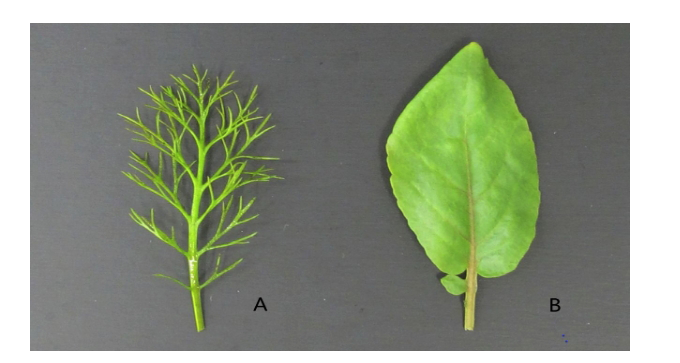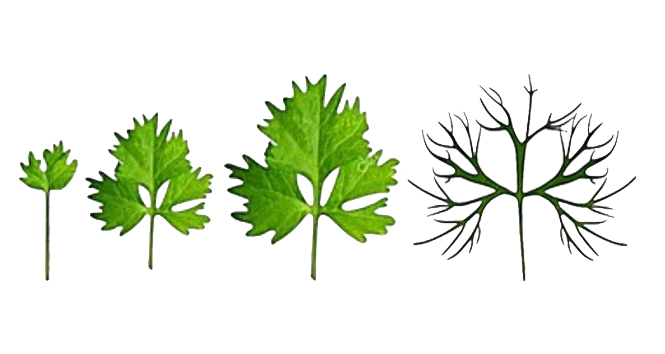What is heterophylly?
Step-by-Step Solution:
1. Definition of Heterophylly:
Heterophylly refers to the phenomenon where a single plant exhibits different types or shapes of leaves. This can occur on the same stem or on different stems of the plant.
2. Occurrence:
Heterophylly is commonly observed in aquatic plants, although it can also occur in some terrestrial plants.
3. Types of Heterophylly:
Heterophylly can be categorized into three main types:
- Developmental Heterophylly: This type occurs when different leaf shapes emerge at various stages of the plant's growth. For example, plants like cotton and coriander exhibit developmental heterophylly.
- Habitual Heterophylly: In this case, different leaf shapes are produced on different parts of the same plant. This type can be seen in certain Indian herbs.
- Environmental Heterophylly: This type is primarily found in aquatic plants, where the leaves that grow above the water (aerial leaves) differ from those that float on the water's surface (floating leaves). An example of a plant exhibiting environmental heterophylly is the buttercup.
4. Examples:
- Developmental Heterophylly: Cotton, Coriander
- Habitual Heterophylly: Indian herbs
- Environmental Heterophylly: Buttercup
Heterophylly refers to the phenomenon where a single plant exhibits different types or shapes of leaves. This can occur on the same stem or on different stems of the plant.
Heterophylly is commonly observed in aquatic plants, although it can also occur in some terrestrial plants.
Heterophylly can be categorized into three main types:
- Developmental Heterophylly: This type occurs when different leaf shapes emerge at various stages of the plant's growth. For example, plants like cotton and coriander exhibit developmental heterophylly.
- Habitual Heterophylly: In this case, different leaf shapes are produced on different parts of the same plant. This type can be seen in certain Indian herbs.
- Environmental Heterophylly: This type is primarily found in aquatic plants, where the leaves that grow above the water (aerial leaves) differ from those that float on the water's surface (floating leaves). An example of a plant exhibiting environmental heterophylly is the buttercup.
- Developmental Heterophylly: Cotton, Coriander
- Habitual Heterophylly: Indian herbs
- Environmental Heterophylly: Buttercup
Topper's Solved these Questions
- MORPHOLOGY OF FLOWERING PLANTS BOOK - ICSECHAPTER - MORPHOLOGY OF FLOWERING PLANTS EXERCISE - Test Your Progress (Short/Long Answer Type Questions )
34 Videos
- MORPHOLOGY OF FLOWERING PLANTS BOOK - ICSECHAPTER - MORPHOLOGY OF FLOWERING PLANTS EXERCISE - Test Your Progress (HOTS)
4 Videos
- MORPHOLOGY OF FLOWERING PLANTS BOOK - ICSECHAPTER - MORPHOLOGY OF FLOWERING PLANTS EXERCISE - Test Your Progress (State whether the following statements are true or false )
27 Videos
- MORPHOLOGY AND ANATOMY OF DIFFERENT SYSTEM OF COCKROACH BOOK - ICSECHAPTER - MORPHOLOGY AND ANATOMY OF DIFFERENT SYSTEM OF COCKROACH EXERCISE - Long Answer type Questions
6 Videos
- NEURAL CONTROL AND CO-ORDINATION BOOK - ICSECHAPTER - NEURAL CONTROL AND CO-ORDINATION EXERCISE - NCERT EXERCISES WITH ANSWER (DIFFERENTIATE BETWEEN)
11 Videos
Similar Questions
Heterophylly means
View SolutionThe picture given below depicts the phenomenon of heterophylly of a plant find the incorrect statement with reference to the same .

(a) The type of heterophylly seen in A and B is an example of plasticity in plants .
(b) The appearance of leaf A is due to the developmental change underwent by the plant in a terrestrial habitat .
(c) Heterophylly is prominently observed between the juvenile and mature stages in cotton plants.
(d) The appearance of leaf B caters to the foliage found in forests.
View Solution
Knowledge Check
Intrinsic heterophylly is found in all except
AcottonBenviornmental plasticityCcarianderDlarkspurAssertion : The difference in shapes of leaves produced in air and those produced in water in buttercup represent the heterophyllous development due to environment.
Reason : The phenomenon of heterophylly is an example of plasticity.AIf both assertion and reason are true and reason is the correct explanation of assertionBIf both assertion and reason are true but reason is not the correct explanation of assertionCIf assertion is true but reason is falseDIf both assertion and reason are false
Which of the following characteristics are associated with halophyte plants?
I. Presence of pneumatophores
II. Leaves and stem have hairy and waxy covering
III. Shows viviparous germination
IV. Leaves show heterophylly
View SolutionFrom the following diagram select that plant whose leaves show this type of heterophylly.

View SolutionWhat is water cycle ? What is its importance ?
View SolutionWhat is hypertension? What are its causative factors ?
View SolutionWhich one does not occur in Selaginella?
(a) Heterospory
(b) Heterophylly
(c) Homospory
(d) Ligulate leaves
View SolutionWhat is anaphylaxis? What are the symptoms of it?
View Solution
